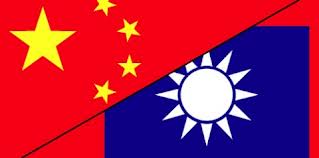Since the landslide election of pro-independence candidate Tsai Ing-wen as president of Taiwan last January, Beijing has been ramping up pressure on the de facto independent island nation, making bids to diplomatically isolate Taiwan and warning that blame for cross-strait conflict would be Tsai’s for her refusal to endorse the One-China policy. Beijing has also been using its economic strength to woo some of Taiwan’s last remaining allies in Africa. Last month, São Tomé and Principe switched its diplomatic allegiance from Taipei to Beijing, reducing Taiwan’s remaining global allies to 21. (Taiwanese media reported that the small West African island nation had asked for over $100 million prior to making the switch.) Earlier this month, after getting a $40 billion investment green light from Beijing, Nigeria ordered an unofficial Taiwanese trade mission out of the capital city of Abuja. (Chinese state media the next day praised Nigeria for “reaffirming commitment to the One-China policy.”) Amid this trend, Burkina Faso and Swaziland—Taiwan’s last two African allies—have pledged to stand by Taiwan. The former reportedly refused a hefty investment offer from Beijing, and the latter said “our friendship is based on our national interests and not on the size of Taiwan’s wallet.” Pauline Bax, Simon Gongo, and Lungile Dlamini report at Bloomberg:
“We get outrageous proposals telling us, ‘if you sign with Beijing we’ll offer you $50 billion or even more,’’’ [Burkina Faso Foreign Minister Alpha] Barry said in an interview in the capital, Ouagadougou, this month. “Taiwan is our friend and our partner. We’re happy and we see no reason to reconsider the relationship.”
[…] The Chinese foreign ministry didn’t immediately respond to e-mailed and faxed requests for comment. “Our relations are concrete,” Eleanor Wang, a spokeswoman at Taiwan’s Ministry of Foreign Affairs, said by phone when asked about the island’s ties with Burkina Faso and Swaziland. “All cooperation projects are being processed as planned.”
[…] “It’d be hard to say how long these two countries can stick with Taipei, given that the entire African continent is turning toward China’s economic orbit,” said Zhang Linzheng, professor of political science at National Taiwan University in Taipei. “The Tsai Ing-wen government would feel the difficulties to prop them up.
[…] Both countries say they’ll continue to lobby for Taiwan’s inclusion as a member of the United Nations.
“I’ve worked as an adviser in Guinea for five years,’’ said Barry, referring to the West African nation that’s drawn billions of dollars in Chinese investment because it holds the world’s largest reserves of bauxite, used to make aluminum. “I know how much Beijing is worth.’’ [Source]
Read more about China’s increasing influence in Africa, via CDT.
Prior to his inauguration, U.S. President Donald Trump appeared to capitalize on mounting cross-strait tensions, turning them into what Fareed Zakaria recently referred to as an “opening bid” in his China negotiations. In a move that unsurprisingly angered Beijing and upset decades of diplomatic tradition, Trump spoke to Tsai on the phone and publicly referred to her as “president of Taiwan” in a tweet. Trump later said that the One-China policy was up for negotiation, drawing further consternation from Beijing. In a Wall Street Journal op-ed criticizing Trump’s “America First” agenda, American foreign policy experts Aaron Miller and Richard Sokolsky warn that Taiwan’s security could be at serious risk in the fallout of such a negotiation:
Should Mr. Trump shift from questioning the “One China” policy–now in effect for more than four decades–to changing it, the impact on U.S. interests and strategy in Asia would be disastrous. The One China policy has enabled the U.S. to protect Taiwan and broaden its relationship with Taipei while maintaining U.S.-China ties that clearly serve American interests. Should Mr. Trump recognize Taiwan, he would likely risk an eventual military clash with Beijing and leave the American strategy in Asia in tatters. The real loser of such a policy change would be Taiwan, whose security would be in serious jeopardy. [Source]
The Wall Street Journal reported last week that after initial enthusiasm on Taiwan for Trump’s rhetorical shift, doubts are now spreading.
See also recent coverage from The Diplomat on top CCP official Yu Zhengsheng’s estimate that cross-strait relations were fit to grow “even more complex and grim.”








